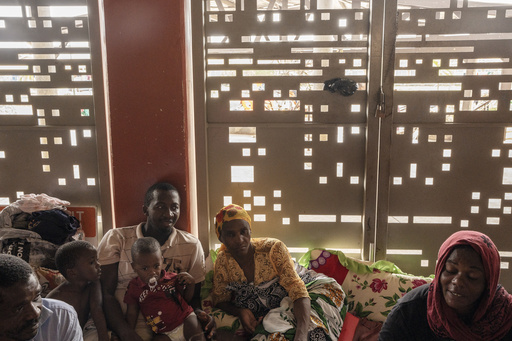On Thursday, President Emmanuel Macron visited the Indian Ocean island of Mayotte to assess the destruction caused by Cyclone Chido, which left the territory grappling with severe shortages of basic necessities like food, water, and electricity.
Upon arriving, Macron was greeted by Assane Haloi, an airport security officer, who expressed her family’s dire situation, mentioning that they had lost access to water and electricity and were left without shelter due to the cyclone’s devastation.
“There’s nothing left; no roofs, no water, no food,” she lamented, pleading for immediate assistance.
Macron took a helicopter ride to survey the damage from above, later making his way to a hospital in Mamoudzou, the capital, where he conversed with medical staff and patients.
Dressed in traditional Mayotte attire, the president listened attentively to residents who voiced their urgent need for support. A hospital employee shared the grim reality that some individuals had not had access to drinking water for over two days.
“We are the ones helping, yet we cannot help ourselves,” the healthcare worker stated emotionally, as Macron offered comfort by placing a hand on her shoulder.
Moreover, the extent of loss remains uncertain, with locals mourning the absence of information regarding the deceased and missing persons, a situation exacerbated by local customs that typically require burials within 24 hours.
Local lawmaker Estelle Youssoufa described the scene as “open-air mass graves,” noting the absence of rescue operations to recover the deceased.
Reports also surfaced of hurried burials, highlighting the scent of death permeating the region.
President Macron acknowledged that the number of fatalities might be underreported, assuring that communication services would be restored soon to help families locate their loved ones.
According to French officials, at least 31 lives were lost, with more than 1,500 recorded injuries, over 200 of which were classified as critical. Nonetheless, fears linger that the actual death toll could reach into the hundreds or even thousands.
Macron disclosed his intention to remain in Mayotte overnight and planned to visit a severely impacted slum area the following morning.
A local resident, Abdou Houmadou, emphasized that immediate aid is paramount, questioning the value of the President’s visit when compared to the urgent needs of the people.
Another individual, Ahamadi Mohammed, expressed a more positive perspective, believing that Macron’s presence would lead to significant aid to help restore the community.
According to Macron’s office, the flight included four tons of food and medical supplies along with additional rescue personnel.
Additionally, a navy vessel arrived in Mayotte on Thursday morning, carrying 180 tons of essential supplies and equipment.
The cyclone devastated slum areas surrounding Mamoudzou, leading to significant losses.
Nassirou Hamidouni, who sought refuge in his home during the storm, witnessed his neighbor and six children perish when their house collapsed.
Now focusing on rebuilding his own destroyed home, he believes the true death toll exceeds official figures due to the catastrophe’s severity.
Alibouna Haithouna, a mother of four, explained her family’s desperate situation as they sought refuge in a school after being displaced.
Tragically, she lost her brother in the disaster and faced numerous bureaucratic obstacles and fees to reclaim his body from the hospital.
Mayotte, positioned in the Indian Ocean between Africa and Madagascar, is recognized as France’s poorest territory.
The cyclone obliterated entire sections of the island, as many residents disregarded evacuation warnings, underestimating the storm’s potential impact.
Home to over 320,000 people, Mayotte has a significant Muslim population, along with an estimated 100,000 migrants, many of whom have left neighboring Comoros, one of the world’s least developed nations, in search of better opportunities.


